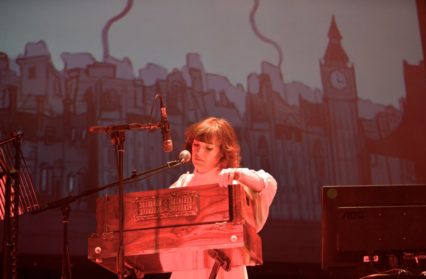John Lavin reviews Gwenno Saunders’ musical performance of Edrica Huws’ poetry as part of Cardiff’s Festival of Voice.
‘To be aware of tone is to be master of your material.’ Edrica Huws
Billed as a one-off show composed of ‘electronica, voice and visuals’, inspired by the life of the poet and ‘patchwork pioneer’, Edrica Huws, Edrica was always the most intriguing prospect when the bill for Festival of Voice was announced. But given that Gwenno’s mesmerising second LP Le Kov was released a mere three months ago, I was probably anticipating an evening of inventive soundscapes rather than the cohesive set of ten new songs that the Millennium Centre audience was treated to.
The stage was made up like a 1930s apartment, featuring a cot, ironing board, box of children’s toys and other traditional accoutrements of motherhood. Set back a little from the front of the stage was Gwenno Saunders herself, surrounded by a tableful of laptops and keyboards, layering the sounds and singing quite beautifully throughout. The programme noted that: ‘there are parallels to be made between stitching and creating electronic music. Both are approached with a meticulous eye / ear for detail and can fit within a domestic life setting (particularly in the context of laptop music.)’ This concept was more than borne out by the sight of Gwenno stitching together a kaleidoscopic tapestry of melody and dissonance with the aid of a variety of electronic equipment.
Ably supported by fellow Welsh Music Prize-winner Georgia Ruth on harp and Angharad Davies on violin, the music veered between beatific and pulsating, quirkily funky states, while being at all times intensely psychedelic. In the wrong hands a concept piece like this could be worthy and dull but the thought processes behind such a negative outcome don’t seem to be ones that Gwenno is even remotely capable of, as these new songs are evidently created in a spirit of joyful, empathetic creativity. As an artist, she clearly relates strongly to Huws’ work, and it is a genuine pleasure to feel its influence on the vibrant colours and layered textures of these new songs.
Huws’ work is known for the way that it deliberately highlighted the stitch work involved in its creation – often appearing to be almost naive in its execution – rather than seeking to hide it from view, as a more traditional patchwork-maker might. This is something that is not only echoed in the music but also in the beautiful accompanying animations by Tad Davies, which loosely tell the life story of Huws; from the time she spent studying at the Royal College of Art; to the years spent bringing up five children during World War II; to the triumph of enjoying her most successful year as an artist when she was ninety-one.
Three of the songs feature lyrics made up of Huws’ own poetry, an idea that works very well and also adds a noticeably different dimension to the music, almost as though Gwenno is forcing herself into different creative spaces in order to accommodate the other artist’s voice. Penultimate song ‘Paris’ ruminates that, ‘The mind can never know as the heart knows… / In her catacomb she is the spouse / And mistress of the mind’ – a lyric that poignantly sums up both Edrica’s aesthetic approach as well as her battle to be both a mother and an artist. (On an incidental note it is almost startling to hear Gwenno sing in English for what must be the first time since her days in The Pipettes.)
The closing piece, ‘Celf yn blodeuo a dod ‘nol ô i Gymru’ / ‘International Art, home to Wales’, sees an animated version of Edrica morph into a version of 2018 Gwenno. Linked together by their shared creativity, as time spools and unspools around them, it is a remarkable and poignant moment with which to sum up what I can confidently describe as one of the most inspirational evenings that I’ve been to in a very long time. It would certainly be a great shame if Edrica was not performed again, and soon.
(Photo credit: Janire Najera)
John Lavin is a regular contributor to Wales Arts Review.











